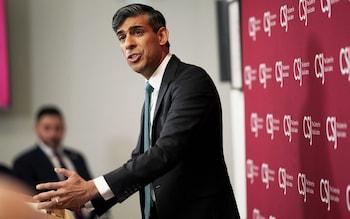Rishi Sunak has said that it is unfair for benefits claimants with mild mental health conditions to receive hundreds of extra pounds a month from the taxpayer.
The Prime Minister unveiled a review of top-up payments received by those with conditions such as anxiety and depression in a speech on Friday.
He warned that the spiralling size of the welfare bill and the need to clamp down on high levels of net migration meant the current situation was unsustainable.
Mr Sunak announced a five-point plan to overhaul the benefits system and get more people back into work if the Tories are returned to power at the next election.
He said: “We need to be more ambitious about helping people back to work and more honest about the risk of over-medicalising the everyday challenges and worries of life.
“Fail to address this, and we risk not only letting those people down but creating a deep sense of unfairness amongst those whose taxes fund our social safety net in a way that risks undermining trust and consent in that very system. We can’t stand for that.”

The Prime Minister said the current number of people out of work was “economically unsustainable” and meant there was “no sustainable way to achieve our goal of bringing down migration levels, which are just too high”.
“We can’t afford such a spiralling increase in the welfare bill and the irresponsible burden that would place on this and future generations of taxpayers,” he warned.
His intervention came after new figures published this month showed the number of “economically inactive” Britons has spiralled to more than 9.25 million.
A post-pandemic surge in long-term sickness has been responsible for much of the rise, pushing more than 700,000 extra people into the welfare system.
The UK is now a major international outlier as the only G7 nation which has not seen the number of people out of work return to the levels seen before Covid.
Experts have warned the failure to clamp down on economic inactivity is having a major drag on the economy, limiting Mr Sunak’s room for measures like tax cuts.
Mental health payments
Mr Sunak announced a significant move to strip top-up payments from tens of thousands of benefits claimants with milder mental health problems.
He said those with conditions such as anxiety and depression should be helped to return to work rather than be left languishing on the long-term sick list.
As part of those efforts he unveiled plans to tighten up how Personal Independence Payments – a top-up to sickness benefits – are awarded.
PIPs are worth up to £740 a month and are paid to those people who struggle with “daily living tasks” and mobility, to cover the extra costs they face.
In the case of a severe physical disability, for instance, the cash can be used to make improvements to someone’s home such as installing a stair lift.
But over the past four years the number of people with mental health conditions claiming PIPs has more than doubled from 2,200 a month to 5,300.
Mr Sunak said this was despite there being limited evidence that people suffering with conditions like anxiety faced significantly higher living costs as a result.
Warning that the system was being “misused” he said it would be better to help people with milder problems by offering them more mental health support instead.
He is looking at restricting the number of conditions which are eligible for PIP payments and “requiring greater medical evidence to substantiate a claim”.
The Prime Minister said those with issues like depression and anxiety could be offered more help like talking therapies in lieu of cash payments.
Benefits fraud
Mr Sunak also revived plans to hand civil servants sweeping new legal powers of arrest and seizure to crack down on fraudulent benefits claims.
He said the Department for Work and Pensions will have enforcement powers like those used by HM Revenue and Customs to go after tax evaders.
Officials will also have the ability to levy fines of up to £5,000 against a wider number of people as part of efforts to bring the welfare bill under control.
“When people see others in their community gaming the system that their taxes pay it erodes support for the very principle of the welfare state,” he warned.
Long-term unemployed
The Prime Minister also recommitted to his plans to strip unemployed people of their benefits payments if they repeatedly refuse to take up job offers.
Mr Sunak announced last autumn that people who are able to work, but who choose not to do so, would lose access to their handouts after 18 months.
But in his speech on Friday he hardened up the crackdown even further, saying that people would be given just a year to accept a job.
He said: “Anyone who doesn’t comply with the conditions set by their Work Coach, such as accepting an available job, will, after 12 months, have their claim closed and their benefits removed entirely.
“Because unemployment support should be a safety net – never a lifestyle choice.”
Ministers have already changed the rules so that benefits claimants now have to accept a job offer from any sector, not just their preferred one, or face losing handouts.
Sick note reform
The Prime Minister announced plans to effectively strip GPs of their powers to sign people off for long-term sickness and hand decisions to employment specialists.
He warned that family doctors were often too willing to acquiesce to their patients’ requests for time off work because they did not want to damage personal relationships.
Mel Stride, the Work and Pensions Secretary, has previously warned that the typical time someone is seen by a doctor before being signed off is just seven minutes.
As a result, an overwhelming 94 per cent of fit notes that are signed by GPs declare that the subject is not fit to carry out any work whatsoever.
The Prime Minister said the statistics showed reform is needed and that “we’re letting people down if we persist with a system that is writing far too many of them off”.
Under the new plans “objective” experts will be drafted in to assess applications for fit notes, with a greater emphasis on encouraging people to work where possible.
Meanwhile the Work Capability Assessment, which acts as a gateway to sickness benefits, will also be “tightened up” to similarly promote the benefits of work.
Benefits overhaul
The final plans of Mr Sunak’s plan will see 1.7 million people who are on legacy sickness benefits moved over onto Universal Credit, which encourages work.
Employment and Support Allowance payments will be phased out, with ministers saying the change will “eliminate a binary choice between work and welfare”.
Mr Sunak also announced that more people who are working part-time will receive increased work coach support to help them take on more extra hours.
Currently those who work under 15 hours a week are placed into the Intensive Work Search Group, meaning they have to meet up with their job coach more often.
That threshold, which was already raised from 12 hours last year, will be hiked once more to 18 hours a week under the Prime Minister’s plans.
Disclaimer: The copyright of this article belongs to the original author. Reposting this article is solely for the purpose of information dissemination and does not constitute any investment advice. If there is any infringement, please contact us immediately. We will make corrections or deletions as necessary. Thank you.



